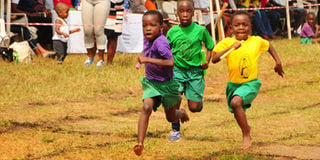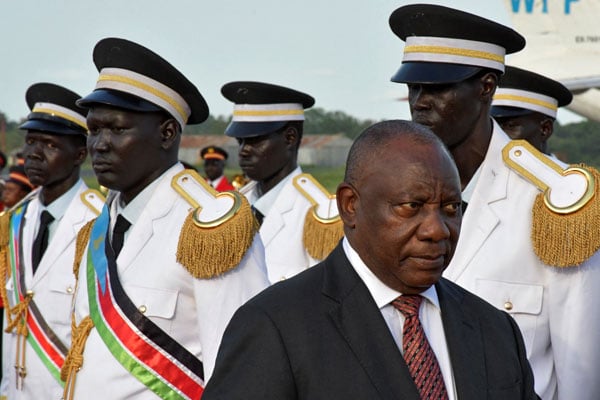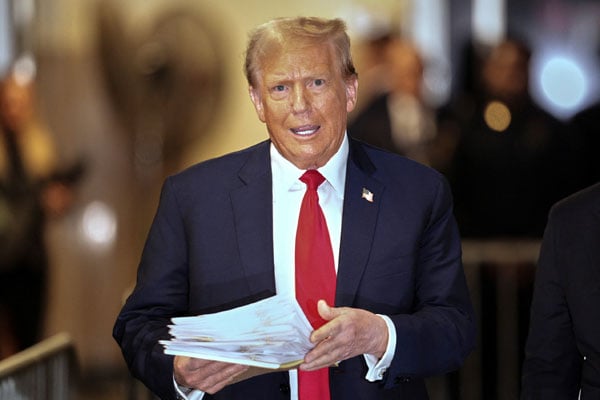Sports: Promoting holistic learning

Pupils of Greenhill Academy, Buwaate compete in athletics recently. Pupils with exceptional talent can pursue it further and make a career of it. Photo by Rachel Mabala
The world has moved away from traditionally known professions to include talent-based ones. It is important, therefore, for schools to groom students in both academics and sports.
As a primary school pupil at Mbarara Municipal School, Teo Mbabazi played in the school netball team. When she joined secondary school in 1992, she knew she wanted to continue playing netball.
It did not come as a surprise, therefore, when at Maryhill High School in Mbarara, she was identified as one of the good players on the netball team.
“While pursuing my Education degree at Makerere University between 1998 and 2001, I was a member of the university team. In 2004 I got a gig to train the netball team at Gashora Girls Academy in Kigali, Rwanda. As a head teacher at Right Care Schools currently, I train the school netball team,” Mbabazi says adding, “I was paid $150 every two weeks.”
Students who attend schools that give special consideration to games and sports such as Mbabazi, are able to develop their talent which gives them an edge in the job market.
Wide range of options
Yusuf Nanga, the sports director (cricket) Masaka Secondary School, says not every child excels academically. “You might discover that a student is better at a particular sport than academics. Therefore, offering an opportunity for them to grow their talent alongside academics provides a holistic learning environment,” he says.
In the event that a school holds a sports galla, students develop a competitive spirit which is eventually reflected in their academics. “For example when a student scores or beats an opponent team, it gives them a confidence boost that they in turn use to improve their academics,” Pascal Kimbugwe, the sports director at Standard High School, Zzana explains.
All work and no play
“Most schools currently use sports for advertising –for their own popularity, and not for the benefit of the students/ pupils,” Kimbugwe points out. “I have seen time allocated for physical education and sports being allocated to extra lessons. Besides, there is no assessment for sports like is the case for academics.”
Nanga also says it is mostly the big government-aided schools, a few private ones and international schools that put effort in promoting sports in schools.
Similarly, Yusuf Kyeyune, the chairman Kampala District Football Association, says schools today are more interested in academics than sports. “Previously, schools would ensure they have at least a football pitch for sports, today, they build storied buildings and do not leave space for sports facilities.”
But Kimbugwe also blames the lack of assessment for laxity of schools to develop sports talent. “Sometimes we have tournaments to participate in and practice to do during the school term, therefore, students engaged in sports may miss tests or lessons yet the schools do not set up timetables for such students to catch up,” he says.
More games introduced
Kimbugwe says different from before, schools are adapting other sports activities other than football and netball. Games such as Volleyball, Cricket, Swimming, handball, rugby, beach soccer, tennis, and basketball are among the games practiced in schools today. “It is usually the issue of facilities and facilitating the sport, but more sports are coming up on interschool and national tournaments,” he says.
Phillip Wokorach, for instance is a rugby player who started playing the game in Primary Four. “I joined Hana Mixed School on bursary for O-Level. After my high school I joined the Buffaloes, and later Heathens as a player,” Wokorach says.
Safety on the pitch
“Our first safety measure is to understand the health conditions of the players. The next thing is to ensure that the grounds/ surfaces are free from sharp objects, and according to each game, protective measures such as wearing helmets for cricket, abdominal guards, shoes and other attires and equipment for safety used before engaging,” Kimbugwe notes.
Health benefits
“Games and sports provide students with a much desired rest from classwork,” Margaret Mbasabye, the principal Kampala Junior School (Najjanankumbi campus), says. She adds that sports also help learners to strengthen their body and other internal systems such as blood circulation. “It also offers mental relief from class work and environment,” she says.
Fagil Mandy, an educationist, says sports is an important aspect in everyone’s life, regardless of age.
“Sports is a major ingredient in providing holistic education. It helps the five body systems to function well. For example it keeps the brain active and awake. Sports is also a driver of positive emotions and it helps in body metabolism. So, how do you expect a child to excel academically if their body is not taken good care of?” Mandy asks.
Mandatory venture
Physical Education and Sports (PES) in schools is one of the policies that were introduced by the ministry of Education and Sports in its National Physical Education and Sports Policy. The policy introduced compulsory Physical Education (PE) for both primary and secondary schools.
“Though we are still struggling to implement PES in all schools, school heads, teachers, parents and students should understand that we introduced PE in schools to improve the general quality of education, because it all starts with our physical wellbeing. Not only for students but for teachers as well,” Sammy Odongo, principle education officer in charge of physical education and sports, ministry of Education, says.
Equipment challenges
Yusuf Kyeyune, the chairman Kampala District Football Association, says sports equipment differs with the different sporting activities. “But to begin with, all schools should at least have a standard football pitch, a basketball court with professional balls.”
Yusuf Nanga, the sports director (cricket) Masaka Secondary School, adds that for games such as swimming, there must be a well-built swimming pool for different ages. for cricket; a ball, bat, bails, abdominal guard, leg pads, helmet, gloves, for tennis; a court, nets, balls, rackets, for netball, a standard netball court, and professional balls, among other equipment.”
Benefits to students
Scholarships. Phillip Wokorach says he joined Hana Mixed School on bursary for his O-Level. He also joined Uganda Christian University on club scholarship.
Exposure. Aside from instilling discipline in students, sports also gives them exposure to people and a life many people only admire. Wokorach was able to tour the UK in 2006 as a member of Kyadondo tag rugby and called up by Uganda Sevens Squad for the Commonwealth games. He currently plays for Kabras Rugby Club in Kenya.




